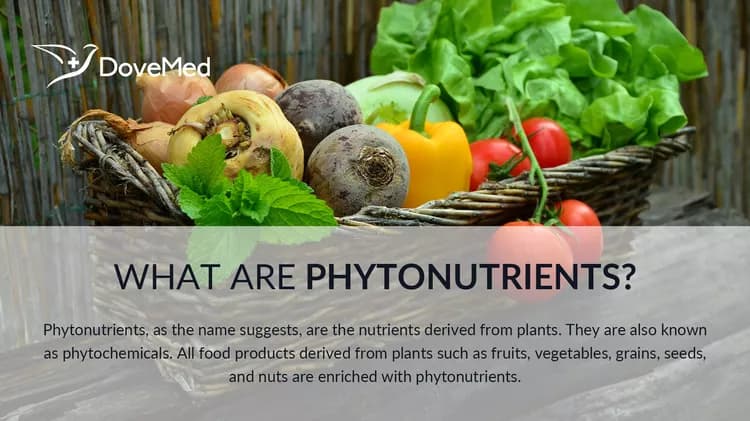Phytonutrients, as the name suggests, are the nutrients derived from plants. They are also known as phytochemicals. All food products derived from plants such as fruits, vegetables, grains, seeds, and nuts are enriched with phytonutrients. There are more than 40,000 phytonutrients that have been identified to date. Phytonutrients are essentially the chemicals which are produced by plants to protect them from harmful UV rays; they also impart different colors to fruits and vegetables. In humans, these phytonutrients play an important role in preventing disease and maintaining health. The U.S department of Agriculture (USDA) has classified phytonutrients into the following classes: carotenoids, polyphenols, inosilnol phosphates, lignans (plant estrogen), terpenes, saponines, sulfides, and thiols. Carotenoids are of four types; alpha carotenes, beta carotenes, lutein, lycopene, and zeaxanthin. Polyphenols are of two types; flavanoids (ellagic acid and coumarine) and non-flavnoids (anthocyanin, catechin, flavanones, flavones, flavanol and iso-flavanon).
The phytonutrients are extremely beneficial in preventing diseases like cancer. According to the American Journal of Nutrition, these phytonutrients reduce the oxidative stress on the cells of our body. This oxidative stress is responsible for causing damage to cellular DNA, thereby causing its mutation that can result in cancer. The phytonutrients are known to aid in apoptosis (destruction) of the cancerous and pre-cancerous cells. It is seen that people who don’t consume fresh fruits and vegetables are twice as likely to develop cancer than those who consume them. These phytonutrients combat the carcinogens present in the body by activating the cytochrome P450 and phase II enzyme activity of cells. In a clinical study conducted to study the effect of flavanoids on lung cancer and other neoplasms, it was seen that there was a significant decrease in the risk of developing lung cancer in subjects who consume dietary flavonoids. The role of carotenoids and polyphenols is also clinically stated in reducing the risk of head and neck cancer.
Phytonutrients are also powerful antioxidants; they reduce the oxidative stress of harmful free radicals present in our body. Free radicals gets into our body through air, water, and food, and are also produced in our body due to stress. These free radicals are responsible for causing various degenerative and inflammatory diseases in our body. According to a study, the phytonutrients present in ginger have the potential to relieve symptoms of rheumatoid arthritis, an inflammatory disorder of the bones and joints.
Phytonutrients also decrease the level of LDL cholesterol in the blood and hence decreases the risk of developing cardiovascular diseases. In a clinical study, it was found that a flavanoid called Naringenin, present in citrus fruits, is associated in decreasing the risk of developing atherosclerosis.
All the plant products are enriched with phytonutrients, but care should be taken while cooking them, since overcooking or cooking for a longer duration causes thermal decomposition of these phytonutrients. The maximum health benefits from phytonutrients are obtained when they are consumed in their natural form i.e. by eating fresh vegetables and fruits. The American Cancer Society has acknowledged that phytonutrients in dietary supplements are not beneficial in reducing the risk of cancer. Hence, to reduce the risk of various diseases, it is very important to include fruits, vegetables, and other plant products in our daily meals.
Related Articles
Test Your Knowledge
Asked by users
Related Centers
Related Specialties
Related Physicians
Related Procedures
Related Resources
Join DoveHubs
and connect with fellow professionals


0 Comments
Please log in to post a comment.